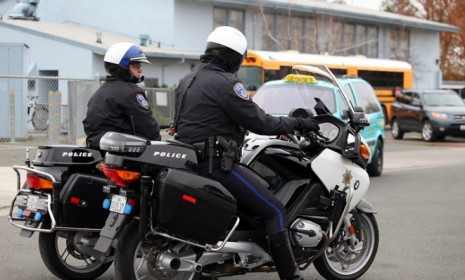Registering autistic children with the police: A strategic idea?
A new Canadian program is supposed to help officers defuse confrontations using sensitivity rather than force. But what about privacy?

A free daily email with the biggest news stories of the day – and the best features from TheWeek.com
You are now subscribed
Your newsletter sign-up was successful
Recently, the Canadian city of Ottawa formally and permanently adopted a voluntary autism registry, so parents can let police know of a child's diagnosis in case of trouble. Is this a logical way to help officers approach an autistic child most sensitively, or is it an invasion of privacy? Here, a brief guide:
What's the purpose of the registry?
The goal is to let police know — before they respond to a call — that they might be dealing with someone with autism spectrum disorder. An autistic child might not be able to speak or respond to commands, and might react violently to lights or sirens — crucial information for officers to have. Also, parents who participate in the registry can provide information to help officers defuse a threatening situation peacefully. "The more information our police officers have when they're responding to a call for service, the better it is for everybody," Ottawa outreach officer Zoye Coburn tells the Toronto Globe and Mail.
The Week
Escape your echo chamber. Get the facts behind the news, plus analysis from multiple perspectives.

Sign up for The Week's Free Newsletters
From our morning news briefing to a weekly Good News Newsletter, get the best of The Week delivered directly to your inbox.
From our morning news briefing to a weekly Good News Newsletter, get the best of The Week delivered directly to your inbox.
Does it help?
It has proved successful enough for the city to end a trial period, initiated in 2010, and make the registry permanent. Some 300 families have signed up. In one case last year, Ottawa police were able to subdue an autistic teenager who had chased his mother around the house with a knife. When officers arrived, instead of drawing their guns, as they are trained to do, they started chatting with the teen about hockey, because his mother had noted in the registry that he found hockey talk calming. Minutes later, the teen handed the weapon to a police officer, and was taken to a hospital. Advocates of the registry contrast such outcomes with cases in cities that lack an autism registry. In Toronto last July, police faced an angry backlash after officers handcuffed a 9-year-old boy with Asperger's Syndrome who'd been aggressive in class.
Is there any downside?
It certainly sounds like this "gives police important tools to work with those on the autism spectrum," says Sierra Black at Babble. "Does it respect the privacy of autistic individuals, though?" It will take a leap of faith for parents to give their children's sensitive medical information to the police. Many people will no doubt wonder if the state will only use the information strictly for good. "What if the state winds up using [it] to treat these children as suspects in crimes when they grow older, or to intervene in their care?"
A free daily email with the biggest news stories of the day – and the best features from TheWeek.com
Sources: Babble, Globe and Mail, Yahoo! News